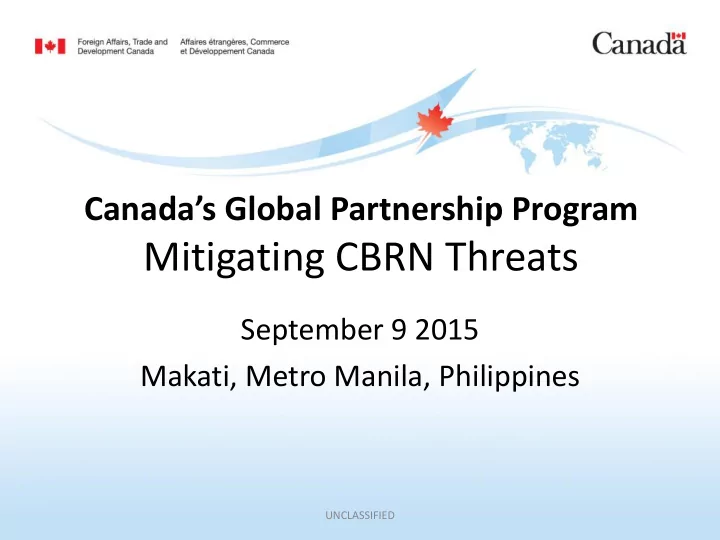

Canada’s Global Partnership Program Mitigating CBRN Threats September 9 2015 Makati, Metro Manila, Philippines UNCLASSIFIED
The Global Partnership Against the Spread of Weapons and Materials of Mass Destruction Global Partnership (GP) Launched in 2002 by G8 leaders in Kananaskis, Canada First 10 years (2002-2012): US$20 billion initiative to address WMD proliferation threats in the Former Soviet Union (FSU) GP Today: New Global Focus, 30 Members, including Philippines Canada’s Global Partnership Program (GPP) Canada’s mechanism to address WMD proliferation and terrorism threats around the world More than C$1 billion spent on WMD threat reduction programming since 2002 International Security Branch: GPP, Anti-Crime Capacity Building Program (ACCBP), Stabilization and Reconstruction Task Force (START), Counter-terrorism Capacity Building Program (CTCBP) and a policy division for Non-proliferation & Disarmament
Global Partnership Program (GPP) 2013-2018 Priorities Thematic Areas of Focus • Nuclear and Radiological Security • Biological Security • Implementing UNSCR 1540 • Chemical Weapons Destruction Engagement in Multilateral Initiatives • Global Partnership Against the Spread of Weapons and Materials of Mass Destruction (GP) • Nuclear Security Summit (NSS) • Global Initiative to Combat Nuclear Terrorism (GICNT) • Global Health Security Agenda (GHSA)
Global Partnership Program WMD Threat Reduction Priorities Nuclear and Radiological Security Biological Security 1. Physical Protection of Nuclear Materials 1. Secure and account for biological pathogens 2. Secure Transport of Nuclear Materials 2. Prevent deliberate biological attacks 3. Radioactive Security 3. Strengthen disease surveillance and 4. Prevention of Illicit Nuclear Trafficking detection 5. Material Management 4. Reinforce biological nonproliferation 6. Verification and Compliance instruments 5. Safe and responsible conduct in the biological sciences Implementing UNSCR 1540 Chemical Weapons Destruction 1. Support the implementation of 1. Assisting in CWD activities in Syria and UNSCR1540 Libya 2. Provide legislative assistance 2. Prepared to assist with destruction of newly declared CW stockpiles 3. Provide CBRN training and equipment 4. Support export controls and border security related to WMDs UNCLASSIFIED
GPP-ASEAN PARTNERSHIP Programming in Southeast Asia Since 2012, the GPP has committed more than $23M in capacity building efforts in partnership with ASEAN member states to strengthen capacities to detect, identify, and respond to CBRN incidents and prevent WMD proliferation.
Biological Security Programming Partnerships in the Region $7 Million CAD for strengthening capacities in ASEAN member countries to detect, diagnose, and contain outbreaks of dangerous infectious diseases, including: i. Strengthen the WHO Emerging and Dangerous Pathogen Network (EDPLN) and ASEAN +3 Laboratory Network (APL); ii. Enhance regional data collection and predictive analysis capacities; iii. Strengthen regional disease surveillance networks (Asia Partnership on Emerging Infectious Disease Research and Mekong Basin Disease Surveillance Network); iv. Enhance biosecurity, biosafety, and national capacity; and v. Strengthen multi-sectoral collaboration in addressing biosecurity threats in ASEAN region.
UNSCR1540 Programming Partnerships in the Region UNODC / WCO Global Container Control Programme (CCP) to build regional capacity in detection and identification of strategic goods (e.g. CBRN materials) -- Indonesia, Burma, Cambodia, Laos, Malaysia, Philippines, Thailand, and Vietnam Canada partnered with the Philippines on a regional UNSCR 1540 workshop on developing 1540 national action plans Support for legislative assistance for the domestic implementation of CBRN-related treaties, such as the development of a national legislation implementation kit on nuclear security, in collaboration with VERTIC, UK and Indonesia (as a joint commitment for the Nuclear Security Summit)
UNSCR 1540 Programming Continued ….Partnerships in the Region Support INTERPOL’s Chemical Anti -Smuggling Enforcement (CHASE) Programme to Southeast Asia to counter cross-border smuggling of chemical warfare agents and toxic industrial chemicals Delivery of six regional workshops globally and follow-up activities to build the capacities of states to ratify international legal instruments related to nuclear security – Southeast Asia workshop took place in Malaysia in 2012 Provision of specialized CBRN training and related equipment for first responders to enhance detection and threat response capability – partnerships with Malaysia and Indonesia
Nuclear and Radiological Security Programming Partnerships in the Region Canada hosted a regional workshop in Malaysia on radioactive source security (2012) Cooperation with Vietnam and with the U.S . Department of Energy’s Global Threat Reduction Initiative (GTRI) on activities related to Vietnam’s conversion, physical protection, and transportation of their nuclear fuel to a safe and secure storage area On-going projects: Partnership with the Philippines (PNRI) on nuclear security cooperation Supporting a nuclear security expert within the ASEAN network to assist with the coordination of nuclear security initiatives in the region Partnership with Malaysia on nuclear security cooperation and training Partnership with Thailand on nuclear security cooperation.
Thank you! Ms. Jennifer Lai , Program Officer, Biological and Chemical Security, UNSCR 1540 Department of Foreign Affairs, Trade & Development Canada Ottawa, Canada Jennifer.Lai@international.gc.ca 10
Recommend
More recommend